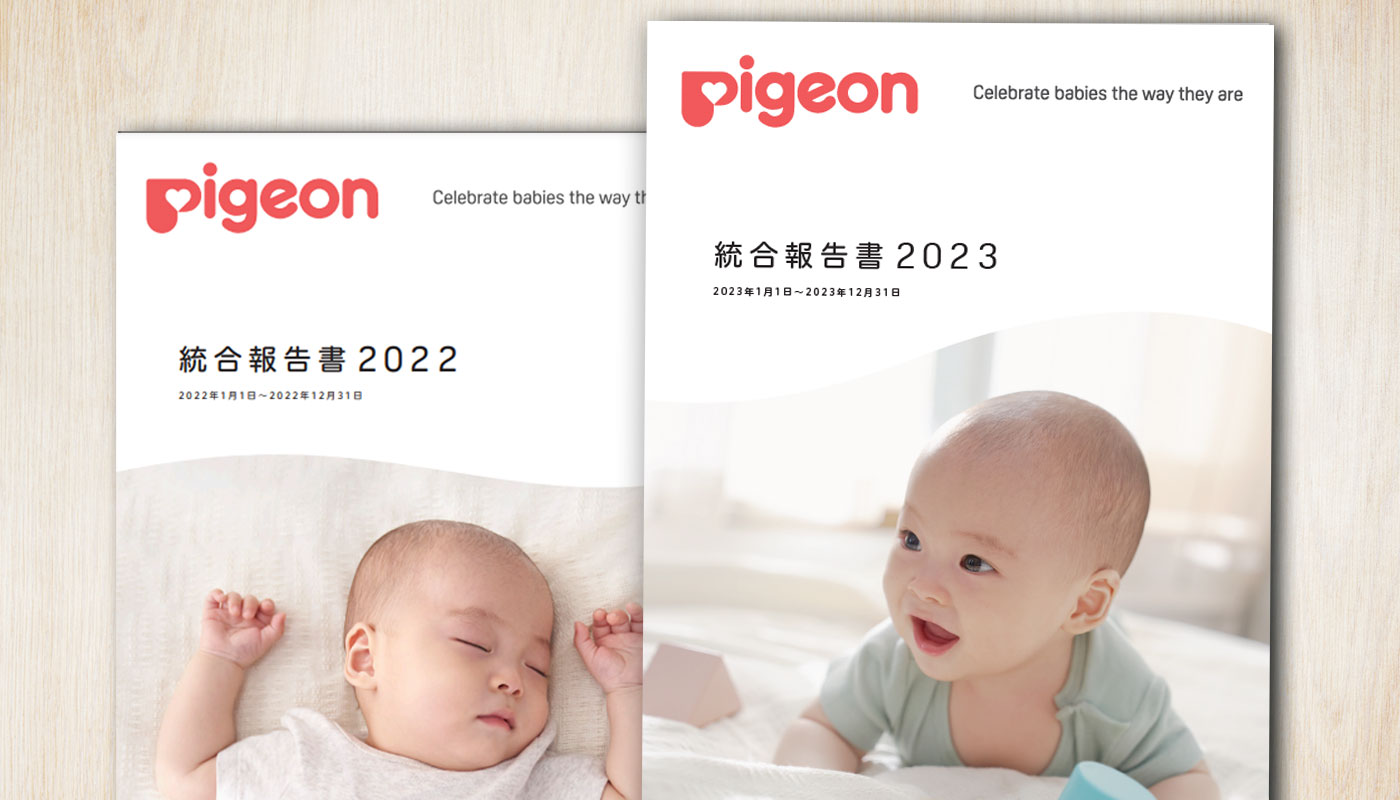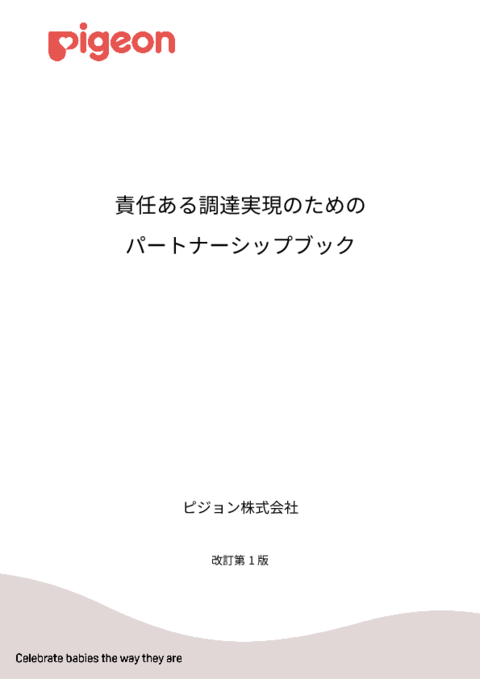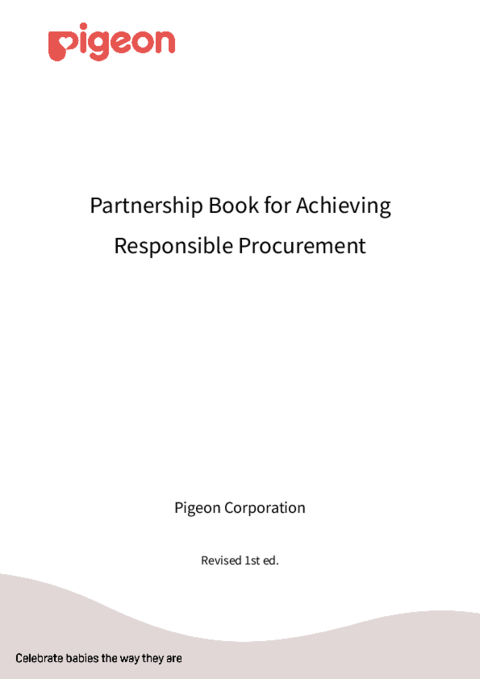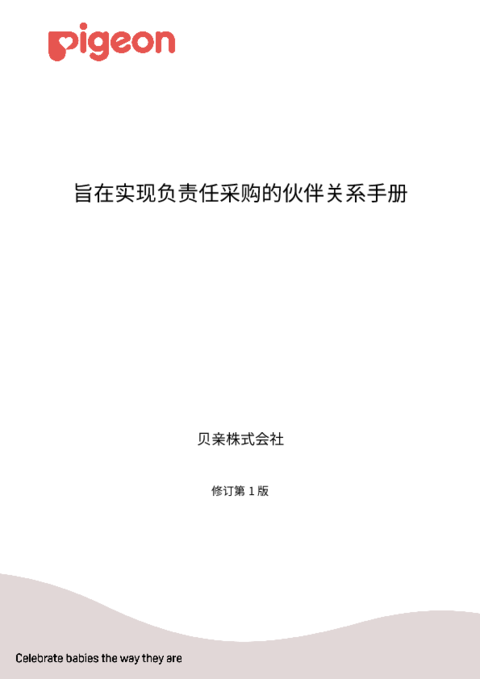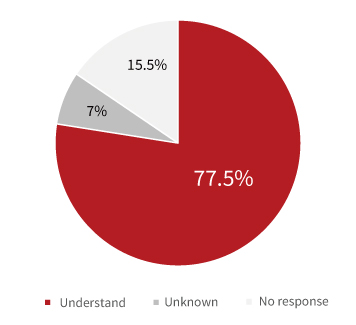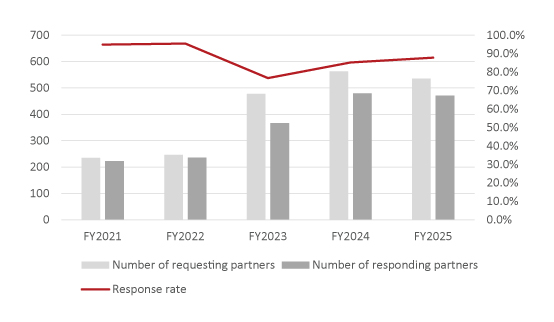Initiatives to Promote CSR Procurement
The Pigeon Group places great importance on mutual communication with our business partners in order to promote CSR procurement and fulfill our social responsibility in each process of our supply chain.
We have translated this policy and guidelines established in December 2020 into nine languages (Japanese, English, Chinese, Korean, Thai, Indonesian, Malay, Hindi, and Turkish), and we have been engaging with our business partners around the world to seek their understanding of and compliance with the guidelines set forth in the CSR Procurement Policy.
We also conduct a CSR Procurement Assessment once a year to promote CSR procurement.
Communication with our business partners
To promote CSR procurement in collaboration with our partners, we provide opportunities for mutual communication.
Briefing Sessions for Suppiers
The Japan Business Unit hold a “debriefing session” once a year to report on our business performance and explain our policies, during which we report on last year's CSR procurement activities and explain this year's CSR procurement assessment. 2025, the briefing was held on March 6, and 54 business partners participated.
Production of Partnership Book for Achieving Responsible Procurement
In order to build continuous collaborative relationships with our partners, grow together, and fulfill our social responsibilities together, we have created the “Partnership Book for Achieving Responsible Procurement” in 2025, which clearly outlines the Pigeon Group's approach to responsible procurement (CSR procurement).
Survey on Understanding of CSR Procurement Policy and Guidelines
To strengthen engagement with our suppliers, we created the “Partnership Book for Responsible Procurement” in March 2025. Concurrently, as part of the CSR Procurement Assessment conducted in 2025, we surveyed the level of understanding of our Group's CSR Procurement Policy and Guidelines. Among the 471 companies that responded to the assessment, 365 companies (77.5%) indicated they “understand” the policy and guidelines.
We will continue our dialogue and advance initiatives toward responsible procurement.
Preliminary risk assessment for new suppliers
For new potential suppliers, we conduct a risk assessment that includes items on the status of the formulation of policies to promote CSR. We are preparing to adopt the "CSR Procurement Self-Assessment Questionnaire" developed by the Global Compact Network Japan (GCNJ) as our standard for new potential suppliers and to conduct a comprehensive assessment including the perspectives of human rights, labor, environment, fair corporate activities (Including anti-corruption, anti-bribery and compliance with competition laws), quality and safety, supply chain, and local communities.
CSR Procurement Assessment
In addition to existing controls based on laws and regulations, we have adopted the CSR Procurement Self-Assessment Questionnaire developed by the Global Compact Network Japan (GCNJ). Since 2021, we have begun conducting surveys in the Japan Business, China Business and Singapore Business as the scope of tabulation. Since 2022, the Lansinoh Business has been added to the scope of tabulation.
Purpose of Assessment
The purpose of this assessment is to understand suppliers' efforts on ESG and identify issues in our supply chain. By working with suppliers to resolve the issues revealed by the survey, we are committed to contribute to solving social issues and build stronger relationships with our suppliers.
Scope of Tabulation
Japan Business, China Business, Singapore Business and Lansinoh Business
Assessed Suppliers
We began assessments in 2021 and have since expanded our efforts step by step to four business units and primary suppliers of production subsidiaries.
| Fiscal year |
Assessment Subjects |
Number of requesting partners |
Number of responding partners |
Response |
|
FY2021 |
Implemented in three businesses excluding Lansinoh | 235 | 223 | 94.9% |
|
FY2022 |
Implemented in all 4BU (hereafter implemented in all 4BU) | 247 | 236 | 95.5% |
|
FY2023 |
Expanded implementation to primary suppliers of production subsidiaries at the Singapore & Lansinoh BU | 478 | 367 | 76.8% |
|
FY2024 |
Expanded implementation to primary suppliers of production subsidiaries within Japan BU | 563 | 480 | 85.3% |
|
FY2025 |
As in 2024, the scope will extend to primary suppliers of all production subsidiaries across all business units. | 536 | 471 | 87.9% |
The 2025 survey covered all primary suppliers in the sales and production subsidiaries of the Japan, China, Singapore, and Lansinoh operations. A total of 536 companies were surveyed and 471 companies responded, for a response rate of 87.9%.
Scope of tabulation |
No. of requested |
No. of responded |
Response rate |
|---|---|---|---|
Japan Business |
156 | 136 | 87.2% |
China Business |
101 | 101 | 100.0% |
Singapore Business |
225 | 195 | 86.7% |
Lansinoh Business |
54 | 39 | 72.2% |
| Total | 536 | 471 | 87.9% |
Assessed Items
The questionnaire used for the assessment was the Self-Assessment Questionnaire (SAQ) prepared by UN Global Compact Network Japan (GCNJ), the Japan chapter of the United Nations initiative on corporate sustainability. A detailed description of the items queried in the questionnaire is shown in the table below. Each intermediate-level item is broken down into five subitems: Legal awareness, Policy, System and responsibilities, Corrective actions and Correction. Respondents are asked to rank their own performance in each subitem on a scale of 1 to 3.
For details of the items, please refer to the "CSR Procurement Assessment Report" at the bottom of this page.
Assessment Results (Consolidated)
The overall average score rate rose to 86.0% from last year's 84.6%. While the “Quality and Safety” and ‘Labor’ categories exceeded 90%, items previously below 80%—such as “Corporate Governance Related to CSR,” “Supply Chain,” and “Coexistence with Local Communities”—now surpass 80%. However, we continue to address these as ongoing improvement areas.
| Assessed items | No. of questions | Average score rate | ||
|---|---|---|---|---|
| FY2024 | FY2025 | Diff. | ||
| 1.CSR-related corporate governance | 20 | 79.1% | 81.6% | 2.5% |
| 2.Human rights | 9 | 83.4% | 85.0% | 1.6% |
| 3.Labor | 23 | 90.7% | 91.2% | 0.5% |
| 4.Environment | 15 | 83.5% | 84.9% | 1.4% |
| 5.Fair corporate practice | 20 | 83.6% | 85.1% | 1.5% |
| 6.Quality and safety | 7 | 92.9% | 93.5% | 0.6% |
| 7.Information security | 9 | 86.3% | 87.2% | 0.8% |
| 8.Supply chains | 7 | 79.5% | 80.5% | 1.0% |
| 9.Harmonious coexistence with local communities | 4 | 78.2% | 80.8% | 2.6% |
| Over all | 114 | 84.6% | 86.0% | 1.4% |
Note: Questions answered with “Not applicable” are deducted from the denominator when calculating the supplier’s score rate.
Efforts Toward Improvement
We will provide suppliers who responded to the questionnaire with their own tabulation results and the average score rates. For items judged to be high-risk, we will highlight them to suppliers and encourage them to make improvements in each business.
CSR Procurement Assessment Report (by Business)
Engagement with suppliers on environmental impact reduction
Understand the status of GHG emissions calculations of suppliers
To reduce the Pigeon Group's Scope 3 GHG emissions, we believe it is essential to collaborate with our partners involved in the products and services we purchase (Category 1). As a first step, we have been using the CSR Procurement Assessment Survey since 2023 to ascertain the calculation status of Scope 1 & Scope 2 GHG emissions of our suppliers. As of FY2025, of the 471 suppliers that responded to the survey, 215 suppliers, or 45%, have already calculated their Scope 1 and Scope 2 GHG emissions.
Scope 1&2 calculations for suppliers (partners) based on CSR Procurement Assessment
|
Number of implementations |
Number of |
Response rate |
Number of |
Calculation |
|
|
FY2023 |
478 | 367 | 76.8% | 146 | 39.8% |
|
FY2024 |
563 | 480 | 85.3% | 207 | 43.1% |
|
FY2025 |
536 | 471 | 87.9% | 215 | 45.6% |



